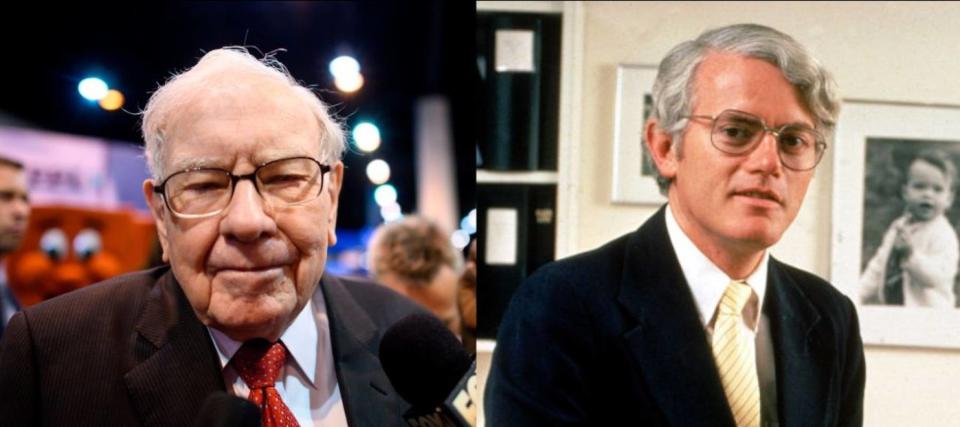Warren Buffett once called Peter Lynch to ask if he could use 1 specific line from his bestselling book in Berkshire’s year-end report. Here’s the line — and how it can make you rich

When mutual fund manager Peter Lynch’s six-year-old daughter told him that there’s a Mr. Buffett on the line, he initially thought it was a prank.
But when he picked up the phone on that Saturday in 1989, he was greeted by the authentic voice of the Oracle of Omaha himself.
Don’t miss
Commercial real estate has beaten the stock market for 25 years — but only the super rich could buy in. Here’s how even ordinary investors can become the landlord of Walmart, Whole Foods or Kroger
Inflation is still white-hot in 2024 — use these 3 'real assets’ to protect your wealth today, no matter what the US Fed does or says
Anything can happen in 2024. Try these 5 easy money hacks to help you make and save thousands of dollars in the new year (they will only take seconds)
As the story of the legendary exchange goes, Buffett told Lynch that he’d read his recently published book, “One Up on Wall Street,” and wanted to use a particular quote in his year-end report, which was due in two weeks.
Lynch was on board, but he was curious so he asked Buffett which line he liked.
Without hesitation, Buffett offered up choice: “Selling your winners and holding your losers is like cutting the flowers and watering the weeds.”
The quote in question did end up making it into the shareholders letter, along with an addition from Buffett: “We are just the opposite of those who hurry to sell and book profits when companies perform well but who tenaciously hang on to businesses that disappoint.”
Let your winners run
This exchange may have happened 35 years ago, but the investment philosophy it’s based on remains just as relevant today: let your winners run and cut your losers.
If you ask Lynch, one of the biggest missteps is selling off a promising company, only to watch as it “doubles, it triples, it quadruples,” he said during a CNBC interview in 2002.
When the host Louis Rukeyser asked him when an investor should sell, Lynch replied, “You ought to find out why you bought the stock.”
In essence, he stressed the importance of revisiting the initial reasons for investing in a company and staying attuned to its narrative. Lynch illustrated this concept using the example of Walmart.
“Ten years after [Walmart] went public, you could have bought the stock and made 500 times your money,” he remarked. “So you have to say to yourself: ‘In this stock, I have a 10-year story? A 20-year story?’ I’ll be able to write that down and follow that. That’s what I do.”
Read more: Thanks to Jeff Bezos, you can now cash in on prime real estate — without the headache of being a landlord. Here's how
Adopt a long-term horizon
Buffett whose reported holding period is “forever,” would no doubt approve of Lynch’s stance.
To be sure, Berkshire adjusts to its portfolio from time to time. However, its overarching strategy is characterized by a long-term outlook. For instance, Buffett's acquisition of Coca-Cola shares in 1988 stands as a testament to this philosophy. Despite the stock's significant appreciation over time, Buffett has held onto the stock through various market fluctuations.
Today, Berkshire Hathaway's stake in Coca-Cola amounts to 400 million shares, valued at $23.7 billion, making it the fourth-largest investment in its portfolio.
Ultimately, Buffett and Lynch employ distinct investment methodologies. But their shared commitment to a long-term investment horizon and letting winners run has undeniably contributed to their respective profound success. When Lynch managed Fidelity’s Magellan Fund from 1977 to 1990, the fund achieved an incredible annualized return of 29.2%.
As for Buffett, Berkshire Hathaway delivered annualized returns of 19.8% from 1965 to 2022, substantially outperforming the S&P 500's 9.9% annualized return during the same period.
What to read next
Rich young Americans have lost confidence in the stock market — and are betting on these 3 assets instead. Get in now for strong long-term tailwinds
Robert Kiyosaki warns 401(k)s and IRAs will be 'toast' after the 'biggest crash in history' — protect yourself now with these shockproof assets
Credit card debt under inflation's shadow: The 4 potent weapons you need to have for a strong financial resurgence
This article provides information only and should not be construed as advice. It is provided without warranty of any kind.

 Yahoo Finance
Yahoo Finance 